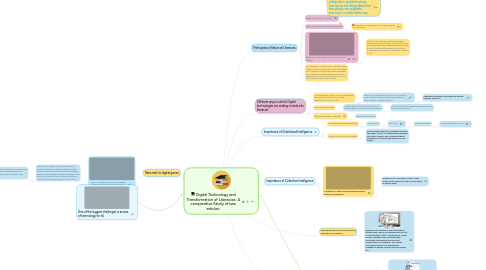
1. Rationale for digital games
1.1. there is a growing need to build bridges between the life worlds of students and the traditional curriculum.
1.1.1. Beavis.C et al studies 6 case studies where teachers leverage "students’ interest in digital games and the culture of gaming to strengthen existing school-based literacies and identify new forms of literacy practice to design curriculum units ‘built for change". (Beavis,C etal, 2015)
1.1.1.1. by using digital games, teachers are able to see a vast improvement in the performance of students who were earlier dropouts in the system.
2. One of the biggest challenges is access of technology for all.
3. growing importance of online collective intelligence communities
3.1. wikipedia is an example of how information is disseminated, revised, and available free of cost, in a participatory culture. Wikipedia has a large number of authors who are passionately committed to presenting true facts but misinformation also prevails. . It's universal participatory nature is its strength and drawback as people can post false information too.
4. importance of meaning making across a broad range of different systems of representation
4.1. each medium has its own affordances and ways of presenting and organising information, and the user learns to navigate through these modes of representation, in order to make intelligent choices.
4.1.1. Example: As an EAP teacher, I have been teaching composition for many years. Now I can see why Kress has encouraged us to move beyond teaching written composition to teaching design literacy.
5. Participatory Nature of Literacies
5.1. What is participatory Culture?
5.2. how is it becoming increasingly important
5.2.1. Affiliations like Facebook: over 1 billion people use Facebook!
5.3. benefits of participatory culture according to Jenkins
5.3.1. peer-to-peer learning, a changed attitude toward intellectual property, the diversification of cultural expression, the development of skills valued in the modern workplace, and a more empowered conception of citizenship. (Jenkins, 2010)
5.4. example of collaboration in participatory culture: today my ex student from Japan asked me to send him a short video wishing another of my students a happy birthday, so that his girlfriend could make an animation remix of all the birthday wishes for him tonite!
6. Different ways in which Digital technologies are making inroads into literacies
6.1. Through Games: Games offer the potential to learn through a new form of direct experience. (Jenkins, 2010)
6.1.1. example: Simulation games, which are used for a wide variety of learning experiences today. e.g pilots training, simulation surgery.
6.1.1.1. Augmented learning is becoming very popular. Example: Space 4D.
6.2. Through Appropriation
6.2.1. Napster generation which finds ways of appropriating content and re distributing it.
6.2.1.1. some better ways of appropriation are forms of remix like photoshop.
6.3. Through Distributed Cognition
6.3.1. example: spellchecker
7. Importance of Distributed Intelligence
7.1. it revolutionizes learning contexts
7.1.1. new curricula
7.1.1.1. new texts
7.1.1.1.1. new learning goals
7.2. it helps solve real world problems
7.2.1. Environmental Detectives: designed by Klopfer and Squire (2005), it is a game where students use location-aware, GPS-enabled handheld computers to solve fictional problems in real spaces.
8. Importance of Collective Intelligence
8.1. it represents a shift from personalized media to media of convergence.
8.1.1. importance of convergence culture: using google maps, people are able to locate places in disaster areas.
9. collaborative problem solving: how layout and design determine how people can negotiate meaning in a collaborative way.
10. Through collaborations like blogging
11. Importance of Networking: the ability to search for, synthesize, and disseminate information
11.1. Classic example is the use of the Google search engine.
11.1.1. Google uses an algorithm that analyzes the links between websites to measure which sites different website creators consider valuable or relevant to particular topics. So do other search engines too like Bing etc.
